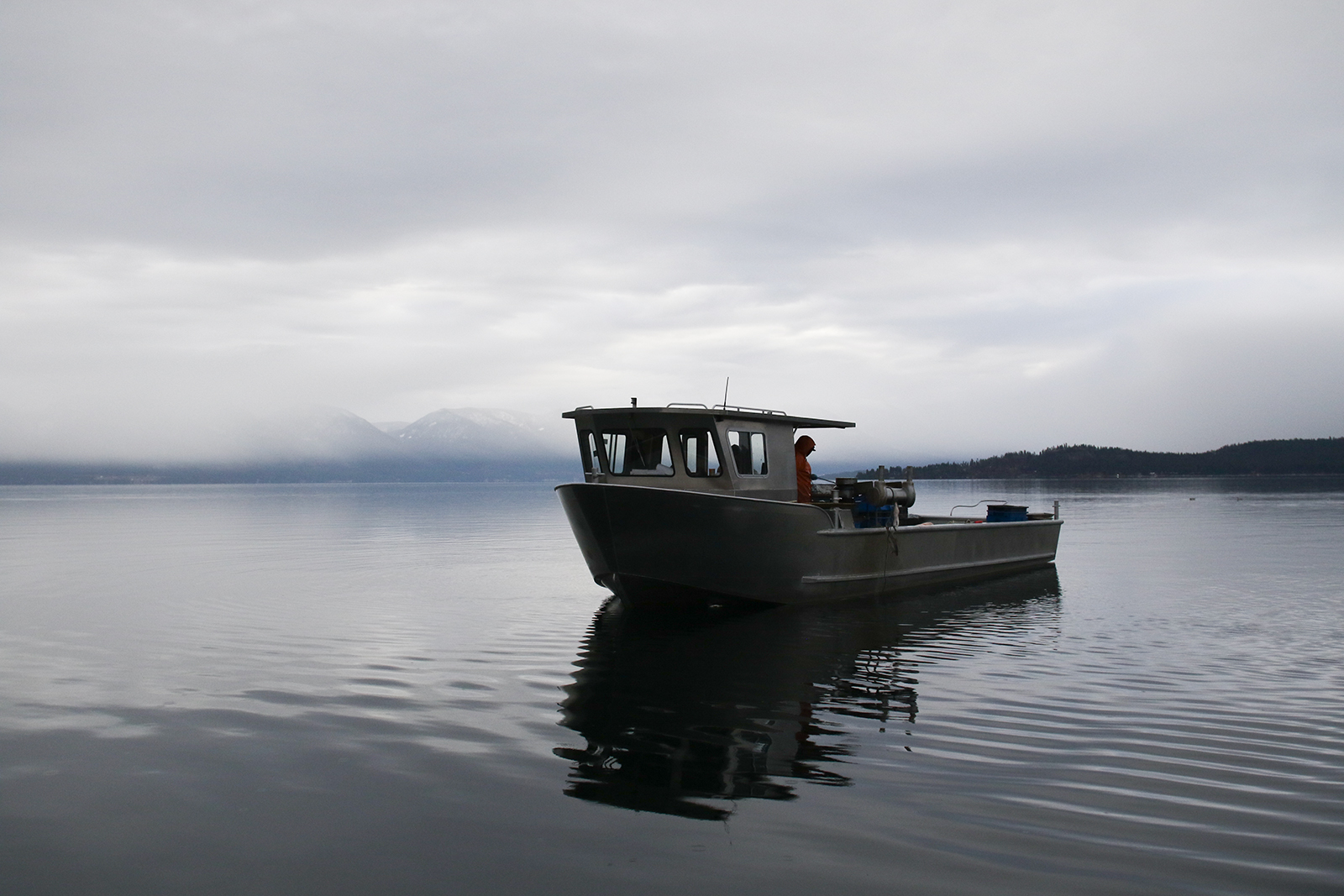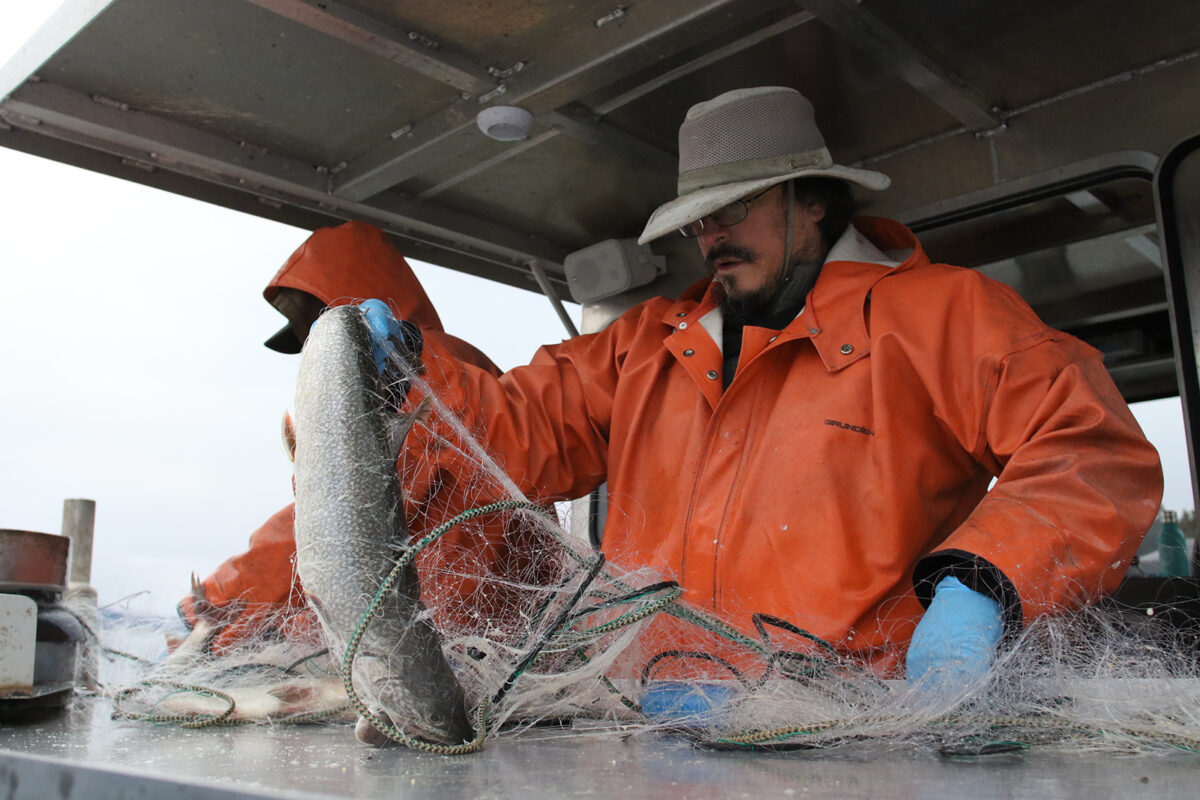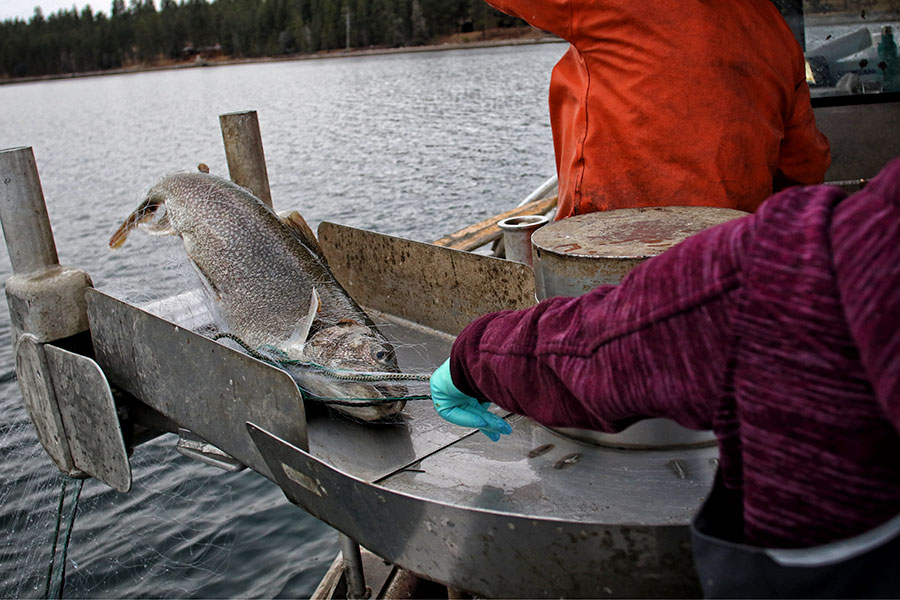Anglers Break Mack Days Record, Signaling Rise of Juvenile Lake Trout
Numbers continue to tick upwards with a week and a half left in the Confederated Salish and Kootenai Tribes’ fishing competition
By Zoë Buhrmaster
This year’s Spring Mack Days has set a new record for the number of lake trout caught in the Confederated Salish and Kootenai Tribes’ (CSKT) flagship fishing contest, which was first organized 23 years ago to help keep Flathead Lake’s population of aquatic invaders in check.
By the end of last week, the seventh week of the event, anglers had reeled in a whopping 46,586 fish. That’s 6,224 beyond the previous record from 2019 with 40,362 entries. Not to mention there is still time left before the contest closes.
Barry Hansen, a fisheries biologist for CSKT, said the record-high number of mostly juvenile lake trout serves as an indicator of the suppression program’s success, while also signaling a shift in the age classification of fish that anglers are landing, from mature adults to juveniles, which now account for the majority of contest entries.
Although Hansen anticipated changes to the lake trout age classifications occurring at some point, it’s happening earlier than anticipated.
“When we began our management efforts to reduce the number of lake trout, we were able to look at other systems where this kind of work has been done, and from a population biology perspective, we knew what the scenario would be,” Hansen said. “So this was a predictable, obvious progression, but it did catch us a little by surprise how quickly it happened.”
The deep-water fish population skyrocketed after the introduction of mysis shrimp to the lake in 1981, snuffing out the native bright red Kokanee salmon population by 1989 before moving on to drastically impact native westslope cutthroat and bull trout populations. In 2000, the CSKT and Montana Fish Wildlife and Parks (FWP) adopted the Flathead Lake and River Fisheries Co-Management Plan, with a goal to “increase and protect native trout populations” and “balance tradeoffs between native species conservation and nonnative species reduction to maintain a viable recreational/subsistence fishery.” In a culmination of suppression efforts, the CSKT’s added the Implementation Plan for Lake Trout Suppression in 2014.
Since 2002, the Tribes biannual fishing contest has played an integral role in downsizing the lake trout population alongside its gillnetting program, harvesting 718,351 lake trout in fall and spring Mack Day events between 2002 and 2022.
Reducing an overly abundant population of a single species, however, also reduces the competition within the population. For lake trout, an opportunistic and sometimes cannibalistic feeder, lowering the numbers of adults gives juvenile fish a higher chance of survival because there isn’t the same level of intraspecies competition and predation as before, said Hansen.
“The stimulation of juveniles is kind of like thinning your garden and getting sunlight in,” he said. “That’s what the lake trout population is doing.”

For a fishing contest that enlists anglers to help suppress lake trout populations, and incentivizes their participation by offering prize money, the fiscal consequences of reaching this era of abundant, adolescent lake trout is already registering in CSKT’s budget.
The more lake trout anglers catch, the more money CSKT pays out.
By harvesting and submitting lake trout, anglers have a chance to win lottery drawings, receive bonus money for single-day totals, or cash in on tagged trout assigned high-dollar prize money. There are also cash awards for smallest trout, top anglers, including for groups specific to women, youth, and “golden” (age 70 and older), to name just a few.
By the end of the fifth week of this spring’s contest, anglers touting huge hauls had already surpassed the contest’s $225,000 budget. To account for the budgetary bust, biologists recalculated awards for tagged lake trout starting April 23 and extending through the contest’s conclusion on May 10 to help reduce risk and liability for the event if one is caught. Prize trout, normally ranging between $100 and $500 and some between $1,000 and $5,000, are now all marked at $100, including the elusive $10,000 Willy.
Even though the prize money revisions force CSKT to make shifts and sacrifices to fund the remaining Spring Mack Days awards, Hansen said that, overall, it’s a “good thing.”
“This is a progression that we expected, came too soon, and is costing more than we thought for this particular event,” Hansen said. “Had we known we would have budgeted in advance, because this is what we’re trying to achieve. There’s a lot of juveniles and we need to get them to the right level.”

Cindy Bras-Benson, a CSKT fisheries specialist who oversees Mack Days, said that a few years ago the team had looked into buying insurance to cover the high-dollar prizes, as some other similar events do, but that the insurance overhead was too high.
“It’s a little disappointing to some people, but there’s still $100 out there,” said Bras-Benson. “That’s more than you had when you went out.”
With the goal to manage lake trout down to a “fishable population,” with low enough numbers for other native trout populations to thrive, Hansen said the fishing will continue, with plans to budget future events for the next step in fishing down the juvenile trout to a manageable level.
“It’s a dynamic condition that just takes time to reach the balance that we’re describing to achieve,” he said. “This system since the last ice age, over 10,000 years ago, it reached its own equilibrium and stability over time. But then we disrupted that, we brought in all these new species that interacted in an entirely different way. Without intervention, those new species would completely take over. So we’ve chosen to intervene, save those native fish, and try to create a new, more stable equilibrium. That is a challenge, and that’s what we’re working through.”
Bras-Benson said there were seven anglers out on the water Wednesday.
“That’s what we want,” she said. “We’ve never gone this far, you know, so this is kind of new ground.”
Spring Mack Days runs until May 10.